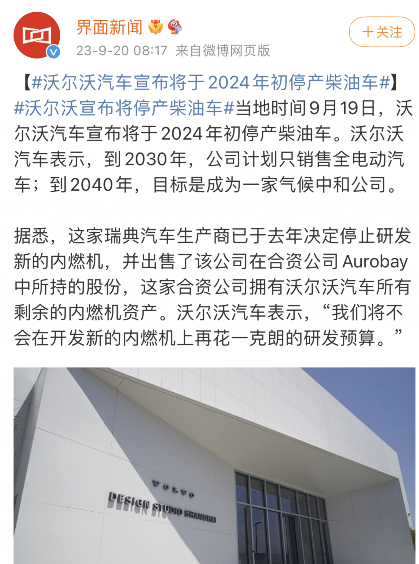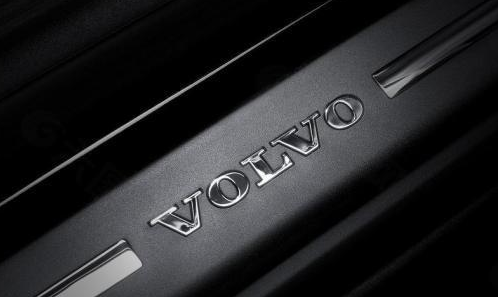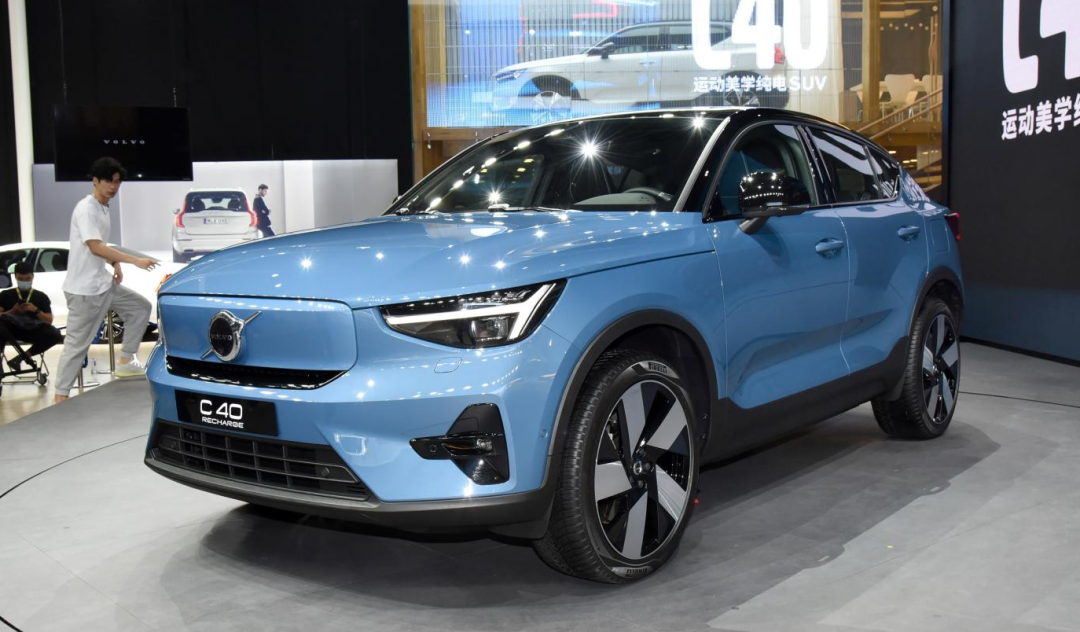In addition to Weibo, there is also WeChat
Please pay attention

WeChat public account
AutoBeta


2024-11-17 Update From: AutoBeta autobeta NAV: AutoBeta > News >
Share
AutoBeta(AutoBeta.net)09/20 Report--
Volvo Cars announced at New York Climate Week that it will stop producing diesel cars in early 2024. In addition to discontinuing diesel vehicles, Volvo also plans to become an all-electric car brand by 2030 and climate neutral by 2040. Volvo's decision to stop diesel cars is a major change, knowing that in 2019, most of Volvo's European market sales vehicles come from diesel cars. Officials say the suspension of diesel production is mainly due to changing market demand and stricter emissions regulations. Volvo CEO Jim Rowan also revealed at New York Climate Week that electric power is our future, better than internal combustion engines. Electric vehicles produce less noise and vibration, saving customers less maintenance costs while achieving zero exhaust emissions.

In fact, it's no surprise that Volvo stopped producing diesel cars. Volvo has been cutting back on diesel models for years, and in November last year Volvo sold its 33% stake in Aurobay to Geely Holdings, pulling out of the development and manufacturing of internal combustion engines altogether. At the time, volvo said: "we will not spend another kroner on developing new combustion engines."
According to relevant information: In July 2020, Volvo announced the establishment of a joint venture company called Aurobay with Geely Holdings and transferred all assets of its powertrain subsidiary Powertrain Engineering Sweden to Aurobay, including engine plants and related R & D teams in Sweden and China, in which Volvo holds 33%. Johan Ekdahl, Volvo Cars 'chief financial officer at the time, said the deal was an important complement to future investment and layout as Volvo itself moved towards an electric strategy. Volvo said the amount of the transaction would be used to develop high-performance, all-electric systems.

It is worth noting that Volvo's global sales have increased year by year in recent years, but in terms of new energy vehicles, sales in China are not ideal, and electrification has always been a worry. Relevant data show that Volvo sold 51,600 vehicles worldwide in August, up 18% year-on-year. From January to August, Volvo sold 447,500 vehicles, up 18% year-on-year. Sales in Europe and the United States were 16,000 and 10,600 respectively, up 46% and 31% year-on-year, respectively. Volvo sold nearly 15,800 vehicles in China in August, down 8 per cent from a year earlier, while pure electric models sold only 200 vehicles in China in August.
In addition, the sales volume of diesel models, which is the source of early Volvo sales, is also declining year by year, and the market share is also decreasing year by year. Relevant data show that Volvo diesel models account for only 8.9% of the global sales volume of the brand in 2022, and the market share of diesel models also drops from 50% in 2015 to 14.1% in July 2023.

In this context, Volvo's full transformation into electrification is not unexpected. Volvo is not late in electrification, but its electrification process is very slow. At present, Volvo's new energy vehicles on sale include Volvo C40, Volvo XC60 New Energy, Volvo S90 New Energy and Volvo S60 New Energy, among which S90, S60 and XC60 launch plug-in hybrid models on the basis of fuel vehicles, and XC40 launches pure electric vehicles on the basis of fuel vehicles. However, as the competition in the new energy vehicle market becomes more intense, Volvo's "oil-to-electricity" models are also difficult to open sales in the new energy market. In addition, Volvo Geely joint venture launched high-end new energy brand Polar Star, In the market performance is also poor, Relevant data show: In the first half of this year, Polar Star sales of 27,900 vehicles.
Electrification transformation has always been a key direction for officials to consider sustainable strategy. Hanken Samuelson, president and CEO of Volvo Car Group, once said: "To continue to lead the market, investment in electrified models and new business models must be increased. Volvo Cars will strive to become the market leader in the luxury brand pure electric segment." According to the plan, Volvo will sell 50% of its global annual sales in 2025 as pure electric vehicles, and the rest will be hybrid vehicles; by 2030, it will stop selling fuel vehicles and become a pure electric luxury car company. However, the vision is beautiful, but as more and more car companies accelerate their electric transformation, Volvo will also face certain challenges in the process of electrification.
Welcome to subscribe to the WeChat public account "Automotive Industry Focus" to get the first-hand insider information on the automotive industry and talk about things in the automotive circle. Welcome to break the news! WeChat ID autoWechat
Views: 0
*The comments in the above article only represent the author's personal views and do not represent the views and positions of this website. If you have more insights, please feel free to contribute and share.











© 2024 AutoBeta.Net Tiger Media Company. All rights reserved.